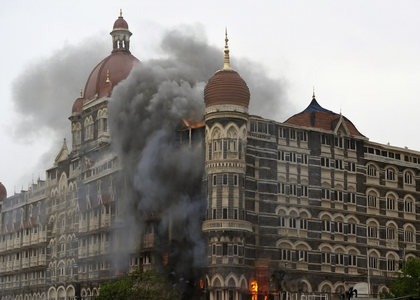26/11 attacks anniversary: A lowdown on Pak-sponsored terror on Indian soil since 1947
By IANS | Updated: November 26, 2025 16:20 IST2025-11-26T16:17:00+5:302025-11-26T16:20:08+5:30
New Delhi, Nov 26 Today marks the 17th anniversary of the 2008 terror attacks, one of the deadliest ...

26/11 attacks anniversary: A lowdown on Pak-sponsored terror on Indian soil since 1947
New Delhi, Nov 26 Today marks the 17th anniversary of the 2008 terror attacks, one of the deadliest and coordinated terror attacks that shook India’s financial capital to the core and was also the city’s darkest hour.
It was one of the incidents when the Pakistani establishment was caught red-handed for fomenting terror in India. The capture of Pakistani national Ajmal Kasab and his explosive revelations on Pakistan-based handlers in orchestrating terror attacks in Mumbai exposed their brazen designs to spread terror in India.
Today, as the nation pays tribute to the victims, survivors and the fallen heroes, on the 17th anniversary of the 26/11 Mumbai terror attacks, here is an account of multiple Pakistan-sponsored terror attacks on Indian soil and how its intelligence agency ISI was directly or indirectly involved in most of these incidents.
The comprehensive report on Pakistan-sponsored terror attacks in Indian since 1947 has been shared by NatStrat, a New Delhi-based NGO.
NatStrat, the Centre for Research on Strategic and Security Issues, has documented a detailed timeline of Pakistani terror attacks in India, chronicling the period, right from the 1947 Independence to the Pahalgam massacre in 2025.
Most of these terror attacks have been linked to Pak-based terror groups, including Lashkar-e-Taiba (LeT), Jaish-e-Mohammed (JeM), and Harkat-ul-Mujahideen (HuM), often orchestrated with support from Pakistan’s Inter-Services Intelligence (ISI).
The report, summarising the neighbouring nation’s adoption of terrorism as its state policy against India, chronicles 26 incidents of terror, categorised broadly under five phases, corresponding to different time periods since 1947.
The report documents the role of Pakistan and its ISI in carrying out terror attacks in India in multiple forms -- from suicide bombing to cross-border infiltration to full-scale military aggressions like the one in the 1999 Kargil war, which further evolved over the years into narco-terrorism, information warfare and even cyber-attacks.
It says that the attack on Parliament (2001) and the IC-814 hijacking (1999) couldn’t have been possible without active coordination by Pakistan’s ISI.
The first two phases of Pakistan-sponsored terror occurred between 1947-1971 and 1972-1989. The first two decades after Independence saw Pakistan inciting rebellion in Jammu and Kashmir’s Poonch, supporting insurgents in North-East and then engaging in two full-scale military wars in 1965 and 1971. The second phase, from 1972-1989, saw Pakistan’s ISI taking the lead and fanning the Khalistan movement and hijacking incidents, which included hijacking of an Indian Airlines plane (Srinagar-Lahore) on January 30, 1971 and then blowing it up on February 2, 1971.
In August 1984, another Srinagar-bound plane was hijacked by Sikh separatists and flown down to the UAE, where the hijackers surrendered before the forces.
The period after 1971, when Pakistani forces were taught a lesson by Indian counterparts, saw a lull for quite some time until the 1990s, when Pakistan’s ISI reignited its nefarious designs to renew terror operations in Jammu and Kashmir.
Under the K2 project, Pakistan’s ISI conspired to destabilise Punjab with the Khalistan movement, with the belief that it would weaken India’s internal security posture, thereby creating conditions favourable to its ‘expansionist’ designs in Jammu and Kashmir.
The 1990s era saw a series of bomb blasts and explosions throughout the country, from Mumbai blasts (1993), Lajpat Nagar blasts (1996), Coimbatore bombings (1998), Red Fort attack (2000) and also the infamous Kandahar plane hijack of 1999.
The next two decades, from the early 2000s till the Pahalgam attack in 2025, saw no refrain or restraint from the Pakistani side despite India flagging its terror designs and holding it accountable on multiple global forums.
In 2001, the Indian Parliament became the target of Pak-trained terrorists, while the Akshardham temple came under attack in 2002. In 2005, a series of explosions rocked Delhi, while in 2006 and 2008, the financial capital saw terror attacks, with the 26/11 attack resulting in the loss of close to 175 lives, carried out by 10 Laskar terrorists.
The recent terror attacks, aided and abetted by Pakistan-based ISI, have largely been targeted at the Indian Armed Forces. Pathankot terror attack (2016), Uri terror attack (2016), Nagrota attack (2016), Pulwama attack (2019) and Pahalgam attack (2005) showed enough hints of Pakistan altering its terror strategy, with the hope of inflicting heavier damage than before.
Disclaimer: This post has been auto-published from an agency feed without any modifications to the text and has not been reviewed by an editor
Open in app